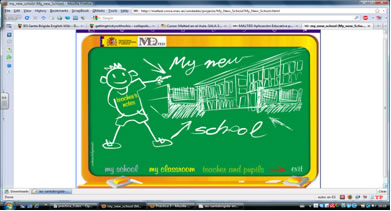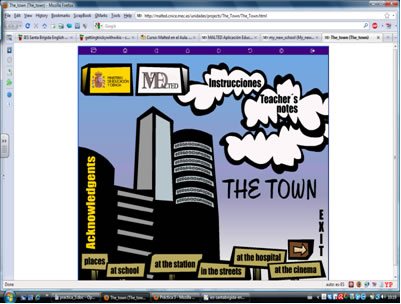
|
PRÁCTICA 3: ORGANIZACIÓN |
|
MICHAEL SIMPSON |
When choosing my teaching materials I had to take into account a variety of factors. Firstly, the fact that most of the pupils in the group I am using Malted with have a poor track record in English and low motivation levels. Although some of them are quite bright, they have either never developed good study habits or have abandoned them. Secondly, the fact that, due to this abandonment of their studies, their age and maturity does not correspond to their level of academic achievement. Thirdly, that the focus of the programme is on office skills and an extensive use of simple ICT functions and that the contents need to have a clear practical application and be demonstrably connected to the pupils' daily life and experience.
Bearing this in mind, I have chosen two Malted Units designed for the first year of ESO: My New School and The Town .


I have chosen these units because they cover the lexical, functional and grammatical structures that I propose to revise with the group in this first term:
• vocabulary about school, basic personal details, places in town, basic prepositions of time and place...
• asking for and giving personal details, describing places, giving directions...
• the present tense of the verb to be, word order in statements and questions, there is/there are, imperatives...
Extra Materials
Because of the peculiar nature of the students and the course, I have not adopted a coursebook and do not insist that the students use a notebook. All of their work will be stored in a folder in their computer and they will give it to me either via e-mail or on a memory stick. They have access to the extra materials on the Wiki that I am developing for all the classes I teach.
At the beginning of the experiment all the students filled in the questionnaire ( encuesta_inicial ) which I downloaded from the course Moodle. They then completed the entry test for Spotlight 1 (OUP), which is the coursebook our department uses in the first level of ESO.
I use the interactive whiteboard to introduce the units to the pupils, to explain the different features common to all Malted units (help, task, glossary etc.) and show them how I expect them to work through the units, as well as to demonstrate some of the exercise types and remind them of whatever details they need to use Malted effectively.
My New School should prove fairly simple for all the pupils and I chose it deliberately to make sure that the weaker students were not put off the process from the beginning. However, for the pupils who finish quickly and by way of revision for the weaker students, I have planned some back-up/extension activities. In line with my plan to keep the course as paper-free as possible, I have found related activities on the Internet to back up and extend their knowledge of the vocabulary and structures studied and these are available for the pupils on their page of my Wiki. ( My New School or version in pdf )
The contents and activities in The Town are a little more complicated and call for a more detailed approach. First of all, there are various writing and speaking activities and these will need to assessed. The students will copy their writing activities (“Describe your city, town or village”) and the various speaking activities through the unit onto my memory stick for assessment. What is more, since the unit is longer and its sections more diverse than those of My New School , a certain amount of revision and consolidation will be necessary before the pupils face assessment. For this reason I have found a considerable number of extra activities for each language item and placed links to them on the Wiki. ( The Town or pdf ) Finally, the pupils will have to look at a map of the village where the school is located and complete some dialogues for giving directions on a document which they can download from the Wiki. ( Santa Brígida map ) This activity is to be handed in and will count for assessment.
Assessment
When the pupils have finished the unit and all the complementary activities they are asked to fill in another questionnaire ( Encuesta_fin_de_unidad ) which is to gauge their response to the unit. The aim is both for me to find out what parts of the unit they enjoyed or found difficult and for them to reflect on what they have learnt and to give some feedback about the process of learning with Malted. At the end of the experimentation period I will also ask them to fill in the final questionnaire from the course Moodle.
During the course of the experiment I will use a simple follow-up sheet , on which I will mark down the students' progress through the unit and extra activities, as well as any comments about their attitude to and participation in the learning process. It is my intention to examine each student individually at my computer, by asking them to complete one task from each section of the unit. I will choose two appropriate tasks per section and offer the students the choice of which activity they do. In the final assessment I will take into account their performance in this assessment activity as well as the activities that they have handed in and their attitude to the learning process and the classroom experience.